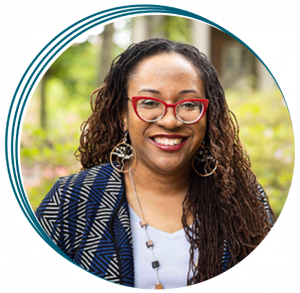Tuesday,
October 12
Meet & Greet with EPIC Board & Staff
Tutorials
Learn tools and strategies for integrating people with disabilities into your research and driving inclusive design.
*Pre-registration required
Learn to identify “quantitative bias” so you can practice and communicate about qualitative research according to its unique value.
*Pre-registration required
Learn how to design ethnofutures projects and expand the time horizons of your work.
*Pre-registration required
More Info
(10:00am–12:00pm)
An end-to-end approach to scoping, planing, shooting, editing and sharing video ethnography projects.
*Pre-registration required
Tutorial
Develop a strategy for cultivating a successful research team and and growing yourself as a leader.
*Pre-registration required
Wednesday,
October 13
Tutorials
Learn how to put sustainability principles into research practice and make the case for sustainability with stakeholders, clients, and organizations.
*Pre-registration required
Instructors: Julia Haines (Senior User Experience Researcher, Google) & Bob Evans (Senior Software Engineer, Google)
Learn to open-source research platform using sensors and logs, surveys, experience sampling, triggers, and prompts.
*Pre-registration required
Learn strategies for designing practical research of inaccessible or future environments.
*Pre-registration required
Thursday,
October 14
Networking
 Jump into EPIC2021 with a set of new connections to build on. A round-robin of fun, bite-sized moments offers just enough structure to spark relationships across the EPIC community.
Jump into EPIC2021 with a set of new connections to build on. A round-robin of fun, bite-sized moments offers just enough structure to spark relationships across the EPIC community.
Thanks to dscout for supporting this session.
Learn about EPIC2021 sponsors.
Sponsored Panel
Presented by Atlassian
![]()

Panelists:
Leisa Reichelt, Head of Research & Service Experience, Atlassian
Caitlin McCurrie, Lead Researcher, Atlassian
Cara Maritz, Researcher, Atlassian
Jake Moody, Research Senior Team Lead, Atlassian
Adam Wride, General Manager of Planning Solutions, GitKraken
With nearly 6,000 Atlassians, achieving customer-centricity that’s meaningful, sustainable, and respectful of people’s attention can be a challenge. Standard approaches and tools can overwhelm populations and lead to “Feedback Fatigue,” particularly in small populations of users. To solve this, we’ve made opportunistic use of the tools and mechanisms for engagement that we have immediately around us: we use Confluence for diary studies, Jira Service Management as an intercept, and we triangulate with feedback captured by our customer-facing collaborators.
In this panel, moderated by Head of Research & Service Experience, Leisa Reichelt, Atlassian researchers and a member of our customer community will discuss how iterating our methods and ways of working helped our product teams achieve customer-centricity without our customers feeling the toll of “feedback fatigue.” We’re looking forward to a lively conversation with our panelists and attendees about the relationships we want to build and process for gathering insights as we co-create the future.
Sponsored Panel
Presented by Facebook
![]()
Panelists:
Jay Hasbrouck (moderator), Pathfinder—New Product Experimentation, Facebook
Heather Patterson, Responsible Innovation Manager, Facebook
Jamie Kimmel, Researcher, Instagram Labs
Pathfinders, foresight strategists, and responsible innovation researchers help Facebook understand how cultures and communities evolve so our teams can create products that meet future needs. They think beyond the current moment to provide insight that minimizes potential risk to people, societies, and environments and help build toward promising opportunities. Although these researchers come from different backgrounds, they all share characteristics that are quite familiar to ethnographers: a propensity to think holistically, an appreciation of evolutionary patterns, and the ability to situate insights within large, complex systems across time horizons. Attendees will learn how pathfinders, foresight strategists, and responsible innovation researchers apply these qualities to their work at Facebook, as well as how attendees might apply similar future thinking and strategic approaches to their own work.
Sponsored Panel (Repeated)
Presented by Atlassian
![]()

Panelists:
Leisa Reichelt, Head of Research & Service Experience, Atlassian
Caitlin McCurrie, Lead Researcher, Atlassian
Cara Maritz, Researcher, Atlassian
Jake Moody, Research Senior Team Lead, Atlassian
Biro Florin, Founder & CEO, Jexo
With nearly 6,000 Atlassians, achieving customer-centricity that’s meaningful, sustainable, and respectful of people’s attention can be a challenge. Standard approaches and tools can overwhelm populations and lead to “Feedback Fatigue,” particularly in small populations of users. To solve this, we’ve made opportunistic use of the tools and mechanisms for engagement that we have immediately around us: we use Confluence for diary studies, Jira Service Management as an intercept, and we triangulate with feedback captured by our customer-facing collaborators.
In this panel, moderated by Head of Research & Service Experience, Leisa Reichelt, Atlassian researchers and a member of our customer community will discuss how iterating our methods and ways of working helped our product teams achieve customer-centricity without our customers feeling the toll of “feedback fatigue.” We’re looking forward to a lively conversation with our panelists and attendees about the relationships we want to build and process for gathering insights as we co-create the future.
Friday,
October 15
Networking

As we “skill up” in tutorials this week, this fun networking session focuses on sharing stories as different kind of professional development. Doing ethnography requires intention, rigor, resilience, improvisation, creativity, and straight-up serendipity. We’ll share some of the triumphant, humbling, and humorous moments that shape our professional journeys as much as formal skills.
Thanks to Verizon for supporting this session.
Learn about EPIC2021 sponsors.
Tutorial
An end-to-end approach to scoping, planing, shooting, editing and sharing video ethnography projects.
*Pre-registration required
Tuesday,
October 19

EPIC2021 Co-chairs Jan English-Lueck, Sam Ladner, and Jamie Sherman launch the main program! Dig into key themes that will unfold over the next three days and meet up with attendees from North and South America and Asia Pacific.
Papers Session
This session examines how we leverage the natively digital spaces where our participants live, work, and play. The authors look at these systems with a critical, informed eye on the context, and on ourselves, to offer methodological innovations that maintain ethnographic integrity.
Building Target Worlds
Markus Rothmüller, Bridgemaker GmbH
Anticipating Future (UX) Design Practice
Mette Kjærsgaard, Institute for Design and Communication
Jacob Buur, University of Southern Denmark
Wafa Said Mosleh, Danske Bank
Feature versus Future: Anticipating Musical Futures in an Online Present
Iveta Hajdakova, Stripe Partners
Keynote: Sarah Ellis
 Sarah Ellis is an award-winning producer currently working as Director of Digital Development for the Royal Shakespeare Company. Sarah is a fellow of the University of Worcester for her work in arts and technology, has been listed in the 100 most influential people working in Gaming and Technology, and was awarded The Hospital Club & Creatives Industries award for cross industry collaboration. She is an Industry Champion for the Creative Industries Policy and Evidence Centre, which helps inform academic research on the creative industries. She has been appointed Chair of digital agency, The Space, established by Arts Council England and the BBC.
Sarah Ellis is an award-winning producer currently working as Director of Digital Development for the Royal Shakespeare Company. Sarah is a fellow of the University of Worcester for her work in arts and technology, has been listed in the 100 most influential people working in Gaming and Technology, and was awarded The Hospital Club & Creatives Industries award for cross industry collaboration. She is an Industry Champion for the Creative Industries Policy and Evidence Centre, which helps inform academic research on the creative industries. She has been appointed Chair of digital agency, The Space, established by Arts Council England and the BBC.
Networking
This event connects attendees in Europe, Africa, Asia, and Pacific regions.
Hosts:
Rama Vennelakanti, Senior Research Strategist, Internet of Things Group, Intel
Oleksiy Moskalenko, Head of Solutions Mapping, UNDP
Wednesday,
October 20
PechaKucha Session
 What does it mean to use creative methods in our research? From which techniques and toolboxes do we begin, if we want to anticipate the toolbox for our future practice? How can we incorporate alternative methods, paying attention to feelings as well as facts? In this session, authors become bricoleurs who put their assumptions about knowledge creation on hold in order to explore a range of unexpected sources.
What does it mean to use creative methods in our research? From which techniques and toolboxes do we begin, if we want to anticipate the toolbox for our future practice? How can we incorporate alternative methods, paying attention to feelings as well as facts? In this session, authors become bricoleurs who put their assumptions about knowledge creation on hold in order to explore a range of unexpected sources.
Our Advocacy Practice for Their Change
Amanda Rosenberg, Workday
Intuition: Thinking through Loopholes
Laura Reiss, Independent
Reconfiguring Home: Seeing Remote Work and School through Mothers and Their Children
Chloe Chang & Vinay Kumar Mysore
Case Studies Session
COVID-19 was a catalyst for rethinking the future of workers and public service providers. Across countries and contexts, researchers needed to understand the changing landscape of labor. These case studies demonstrate how researchers have anticipated new worker realities.
Anticipating Needs: How Trauma-Informed Research During COVID-19 Changed Our Everyday Work
Meredith Hitchcock, Airbnb
Sadhika Johnson, Airbnb
Human Skills as Essential Skills: Preparing Low-Skilled Job Seekers for Inclusion in the Future Economy
Minnar Xie, Blueprint
Ebony Bertorelli, Blueprint
Reconnecting with the Public
Lok Yi Lee, Brandnographer
Lyra Jiang, Brandnographer
Networking
Hosts:
Nelle Steele, Nelle Steele Research
Bec Purser, Senior Manager of Service Design, Transport for NSW
Panel

Afra Chen, Moderator (Research Director, Inner Chapter)
Chuma Anagbado (Managing Partner & Co-founder, Aziza Design)
Natascha Nanji (Writer and Creator)
Rasa Šmite (Founder, RIXC Art Science & Culture Center)
Raitis Šmits (Founder, RIXC Art Science & Culture Center)
In the age of pandemics and climate crises, reality is represented via varied narratives on health, politics, and the environment across different cultural and social contexts. As artists, designers, and ethnographers practicing the art of narration within different specialties and contexts, this panel aims to showcase how creative professionals re-organize their methods, practices, relationships, and lives in the face of present circumstances. Panelists will share how art and design can help us reflect upon the present and address any future challenges.
Networking
This event connects attendees in Europe, Africa, Asia & Pacific regions.
Hosts:
Chris Hayward, Design Anthropologist, Populus & Chris Hayward Design Anthropology
Rama Vennelakanti, Senior Research Strategist, Internet of Things Group, Intel
PechaKucha Session
 These presentations share a productive commitment to storytelling as a way to address what is uncertain or even risky. They dig deep into the ways that stories—and critically, the way stories are told—can have great bearing on how we anticipate and create futures.
These presentations share a productive commitment to storytelling as a way to address what is uncertain or even risky. They dig deep into the ways that stories—and critically, the way stories are told—can have great bearing on how we anticipate and create futures.
Change the Category, Change the World
Jennie Leng, Independent
Who Deserves to Be Observed? Wrestling with the Avant-Garde
Letizia Nardi, InProcess
Lola Billaud, InProcess
Anticipating Shared Futures: Emotion, Connection & Relationships
Sarah Heffernan, Deloitte Digital
Thursday,
October 21
Papers Session
A digitally connected world ostensibly signifies “progress” and “betterment”—but for whom exactly, and in what ways? In this session, we consider how ideas that lead to progress can be better situated within communities, and how anthropology supports communities that originate ideas to continue to be stewards, even within the context of the instantaneous and digital sharing.
Weaving textile futures: Indigenous resistance and Intellectual Property
Amapola Rangel Flores, University of the Americas Puebla
Cities as anticipatory systems: analyzing “weak signals” to explore beyond the predictability of their future.
Nora Morales,UAM Cuajimalpa
Salomon Gonzalez, UAM Cuajimalpa
Keynote: Ebony Elizabeth Thomas

Ebony Elizabeth Thomas is Associate Professor in the Literacy, Culture, and International Education Division at the University of Pennsylvania’s Graduate School of Education. She studies how people of color are portrayed—or not—in children’s and young adult literature, and how those portrayals shape our culture. As this literature continues to dominate publishing and Hollywood, she strongly believes that the field can become one of the most effective postcolonial, critical, and activist projects of all. Professor Thomas has been interviewed about her work in international media, including MSNBC, the BBC, the New York Times, the Philadelphia Inquirer, and the Chicago Tribune.
Panel

Marc LaFleur, Moderator (Partner, Human Centered Design, Cognizant)
Devon Powers (Associate Professor, Department of Advertising and Public Relations, Temple University
Jacques Barcia (Research Fellow, Institute for the Future)
Jorge Camacho (Co-Founder, Diagonal)
Jennifer Lee Fuqua (Experience Design Director, Ogilvy)
Events of the 18 months have upended questions of the future and, for business, cast a new light on how it might better contemplate and plan for uncertainties. Covid has also opened up a new sense of potential when it comes to re-inventing or designing better or new futures for ourselves, providing a sense of agency and fluidity that had, until recently, seemed less tangible. This panel will engage in this dialogue with the future, particularly as it relates to the future of business and the ways in which business could contemplate, confront and shape the future.
Papers Session
The emic position is an ethnographic tradition, fraught with contradictions of the multiple perspectives brought to bear on the interpretation of culture. Ethnographers in this session call upon us all to examine how ethnography can truly embrace the communities it watches. These authors show us that where and how the emic tradition can be brought forth, reinvented, and invigorated.
Reimagining Livelihoods: An Ethnographic Inquiry into Anticipation, Agency, and Reflexivity as India’s Impact Ecosystem Responds to Post-pandemic Rebuilding
Gitika Saksena, LagomWorks
Abhishek Mohanty, LagomWorks
Empowering Communities: Future-making through Citizen Ethnography
Sophie Goodman, Sophie Goodman Research
Monty Badami, Habitus
Case Studies Session
Retooling ethnographic inquiry during the pandemic, researchers worked with corporate, governmental, and community stakeholders to anticipate the future of hygiene and shape sensitive governmental crisis-response strategies.
The Future of Hygiene: Constructing Expansive Futures
Siddharth Kanoria, Quantum Consumer Solutions
Dimitri Berti, Quantum Consumer Solutions
Christi Kobierecka, Unilever
Anticipating the Unanticipated: Ethnography and Crisis Response in the Public Sector
Christina Cheadle, Stripe Partners
Hannah Pattinson, Surrey County Council
Networking
This social event connects attendees in Europe, Africa, Asia and Pacific Regions.
Hosts:
Chris Hayward, Design Anthropologist, Populus & Chris Hayward Design Anthropology
Bec Purser, Senior Manager of Service Design, Transport for NSW
Friday,
October 22
Papers Session
Future visions are products of their locations. But what if those visions are crafted at the periphery and not at the centre? This session decenters visioning, to explore futures from those often silenced, and to highlight ways of doing this decentering.
Come to Your Senses: Ethnography of the Everyday Futuring
Rebekah Park, Gemic
Jana Jevtic, Gemic
Futures in Things: Locating the Promise of Infrastructures in Public Libraries
Sandjar Kozubaev, Georgia Institute of Technology
Carl DiSalvo, Georgia Institute of Technology
Keynote: Jason Lewis
 Jason Edward Lewis is University Research Chair in Computational Media and the Indigenous Future Imaginary and Professor of Computation Arts at Concordia University. His multidisciplinary research and creative practice has been central to developing Indigenous media art in North America and worldwide, establishing a vital conversation about the interaction between Indigenous culture and computational technology. His contributions comprise scholarly writing, art making and technology research, as well as his leadership of the Initiative for Indigenous Futures and his creation of the Indigenous Futures Research Centre. Lewis also spend a decade working in a range of industrial research settings, including Interval Research, US West’s Advanced Technology Group, and the Institute for Research on Learning, and the venture capital firm Arts Alliance.
Jason Edward Lewis is University Research Chair in Computational Media and the Indigenous Future Imaginary and Professor of Computation Arts at Concordia University. His multidisciplinary research and creative practice has been central to developing Indigenous media art in North America and worldwide, establishing a vital conversation about the interaction between Indigenous culture and computational technology. His contributions comprise scholarly writing, art making and technology research, as well as his leadership of the Initiative for Indigenous Futures and his creation of the Indigenous Futures Research Centre. Lewis also spend a decade working in a range of industrial research settings, including Interval Research, US West’s Advanced Technology Group, and the Institute for Research on Learning, and the venture capital firm Arts Alliance.
